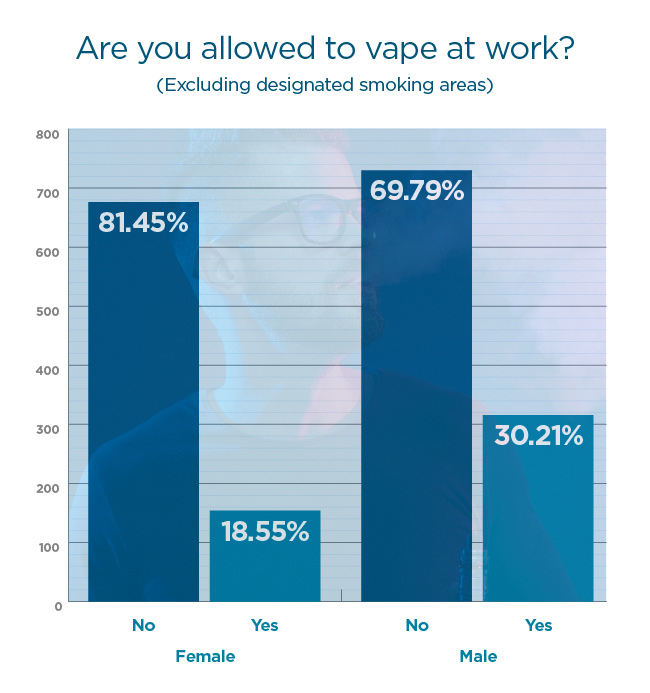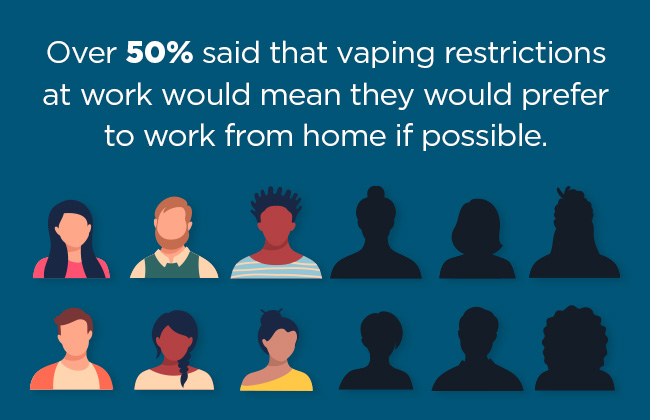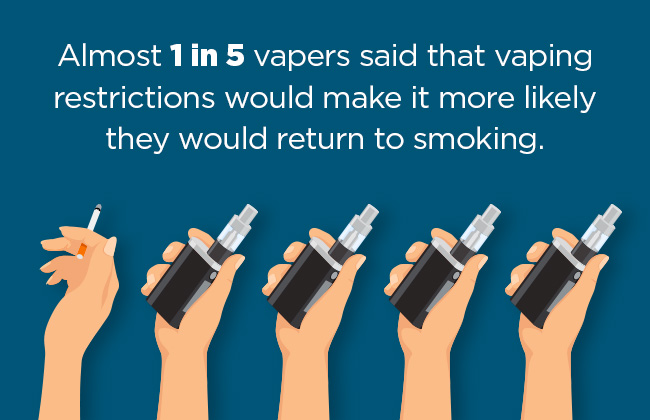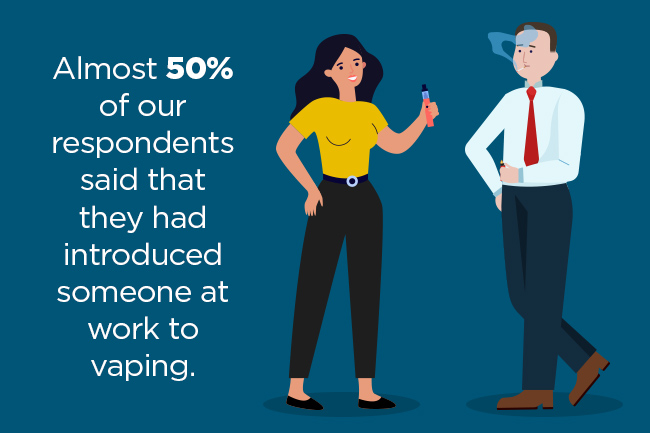Vaping in the Workplace Study
We spend a third of our waking lives at work. The environment we work in, the people we work with and the rules we work under can have a huge influence on our health and happiness.
One area which has the direct ability to make a positive impact on health at work is vaping. In contrast to smoking, people are legally allowed to vape inside, there is no evidence that passive vapour causes harm to bystanders (1) and the government actively encourages employers to provide a smoke-free area for vapers (2).
Yet while there are a number of studies suggesting that vape restrictions lead to increased smoking rates, we found little research looking at vaping in the workplace.
In an attempt to address this, The E-Cigarette Direct Vaping in the Workplace Study surveyed over 1900 vapers. We wanted to understand the challenges faced by vapers in the workplace, and gather data that will help employers make informed decisions to aid staff retention, morale and health.
This survey was conducted by E-Cigarette Direct, a leading online vape retailer. Images and data may be re-used when credited to E-Cigarette Direct. For further information, including the raw data in CSV format, and comment please contact us.
Contents
Key findings
The majority of vapers are not allowed to vape at work, other than in designated smoking areas, yet over 18% say that vape restrictions (only being allowed to vape in designated smoking areas) make them more likely to return to smoking. 40% of vapers say they would be more likely to stay in a job where they are allowed to vape.
In addition, half of the respondents indicated that they would prefer remote working if there were vaping restrictions at work, while a further 7% would consider changing their work role because of restrictions. The survey also highlighted that vapers suffer from negative reactions, with some reporting negative reactions, discrimination and bullying.
Method
Our survey was put together on MailChimp, and sent out to vapers who had subscribed to our newsletter. The survey was incentivized with a £100 Amazon voucher. All questions were optional. Demographic information was collected including occupation, sex and region. A total of 1931 respondents took the survey, with the vast majority answering all the questions.
Survey Analysis
Work restrictions
75% of vapers are not allowed to vape at work, unless in dedicated smoking areas.
This is in direct contravention of Public Health England guidance, which states:
“...vapers should not be required to use the same space as smokers, as this could undermine their ability to quit smoking and stay smokefree, particularly among those most heavily addicted.” (2)
The result was significantly higher for women (81.5% not allowed to vape) compared to men (70% not allowed to vape). This is likely to be tied to gender differences in industry.
For example, vaping restrictions were most likely to be found in Finance, Banking and Insurance (88%) followed by Government, Health and Education (86%). It was least likely to be found in Construction (44%). Only 12 (1.4%) of our female respondents worked in construction, compared to 85 (8%) of our male respondents, while 30.7% of our female respondents worked in Government, Health and Education.
A majority of respondents (880/56%) who were not allowed to vape at work would like to see more breaks to allow vaping.

Retention
We wanted to know whether a positive attitude towards vaping meant it would be more likely that someone would stay in a job role.
40% of respondents said they would be more likely to stay in the same role if they were allowed to vape at work. There was little difference between male (42%) and female respondents (38%) respondents. 140 respondents (7.3%) also said they would consider changing their role because of vaping restrictions.
Remote working
With many businesses looking at returning employees to the office on either a full or hybrid basis, we wanted to know how vaping restrictions would affect vapers’ attitudes towards returning to the workplace.
Over half of vapers (50.9%) said that vaping restrictions at work would mean they would prefer to work from home if possible.
A further 10% felt anxious about returning to work because of vape restrictions. Women vapers were more likely to be anxious about returning to the workplace (17% of female vapers) than men (12.93% of male vapers).

Smoking Cessation
Almost 1 in 5 vapers said that vaping restrictions would make it more likely they would return to smoking. Men were slightly more likely to think that vaping restrictions would make them more likely to smoke again (19.5%) than women (17%).

This coincides with other research that shows that vaping restrictions can lead to an increase in smoking rates (3). For example, a study by Friedman et al found that adding vaping restrictions to smoke free laws likely undermines the effectiveness of smoking bans (4).
Almost half of our respondents said they had introduced someone at work to vaping (45% of women, 52% of men). Given that Action on Smoking and Health data shows that the vast majority of vapers are smokers or ex-smokers and that a majority of vapers use e-cigarettes to either give up smoking or to prevent relapse, this could have a positive impact on health in the workplace. (5)

Discrimination Against Vapers
80 respondents said they had been asked in a job interview if they vaped, with 41 suspecting they were refused a role because of vaping. The same number (41) felt that their career prospects had been damaged by vaping, while 13 people said they had been dismissed for vaping.
224 respondents of vapers felt they had been discriminated against because of vaping. Men were more likely to report being discriminated against than women. Almost 1 in 5 people said that colleagues had reacted negatively to them vaping, while 44 said they had been bullied because of vaping.
Demographics
Gender:
Men: 1054
Female: 844
Other: 7
Prefer not to say: 21
Occupation:
Govt, health, education & defence: 409
Professional & support: 208
Retail & wholesale: 229
Accommodation & food: 62
Transportation & storage: 94
Construction: 100
Info & communication: 77
Finance, banking & insurance: 85
Real estate: 12
Other: 650
Region:
East Midlands: 141
East of England: 107
London: 129
North East: 79
North West: 179
South East: 220
South West: 285
West Midlands: 198
York & Humber: 128
Northern Ireland: 53
Scotland: 140
Wales: 252
Outside the UK: 20
Recommendations for employers
Our data shows that requiring vapers to smoke outside or in dedicated smoking areas increases the risk of vapers relapsing to smoking and can damage staff retention. It can also make employees more reluctant to return to office work after working remotely.
We recommend that employers consider a dedicated vaping policy which clearly distinguishes smoking from vaping. While not every employer will want to allow vaping in the general workplace, creating a dedicated, indoor vaping area could help smoking cessation rates, reduce the risk of relapsing to smoking and improve employee morale, reduce anxiety and aid staff retention.
To alleviate anxiety amongst non-vapers, it’s also worth providing guidelines for vapers. This could include recommending the use of low-powered devices which produce smaller amounts of vapour, or blowing vapour down instead of into the room.
In addition, it’s clear that many vapers experience a negative reaction towards their vaping habit. That’s despite the fact that almost all vapers use vaping to quit or cut down on smoking or to prevent relapse. We recommend employers ensure that they and their employees are aware of Public Health England’s guidance on vaping; it is at least 95% safer than smoking and it is the most effective and popular way to quit smoking. (6)
Sources
- Bauld, L, McNeill, A, Hajek, P, et al, 2017. E-cigarette use in public places: striking the right balance. Tobacco Control 2017;26:e5-e6. [Online] Available at: https://core.ac.uk/download/pdf/82925438.pdf.
- Public Health England, 2016. Use of e-cigarettes in public places and workplaces: Advice to inform evidence-based policy making [Online] Available at: https://assets.publishing.service.gov.uk/government/uploads/system/uploads/attachment_data/file/768952/PHE-advice-on-use-of-e-cigarettes-in-public-places-and-workplaces.PDF
- Dunworth, J., 2021 Up In Smoke: How Vape Bans Increase Tobacco Use. [Online] Available at: https://www.ecigarettedirect.co.uk/blogs/ashtray-blog/vape-bans-smoking-rate
- Action on Smoking Health, 2021. Use of e-cigarettes (vapes) among adults in. [Online] Available at: https://ash.org.uk/wp-content/uploads/2021/06/Use-of-e-cigarettes-vapes-among-adults-in-Great-Britain-2021.pdf
- Friedman AS, Oliver JF, Busch SH, 2021. Adding vaping restrictions to smoke-free air laws: associations with conventional and electronic cigarette use. Addiction. Aug;116(8):2198-2206. doi: 10.1111/add.15434. [Online] Available at: https://pubmed.ncbi.nlm.nih.gov/33565665/
- Newton, J., 2018. Key questions and findings from our e-cigarette evidence update. [Online] Available at: https://ukhsa.blog.gov.uk/2018/02/06/key-questions-and-findings-from-our-e-cigarette-evidence-update/